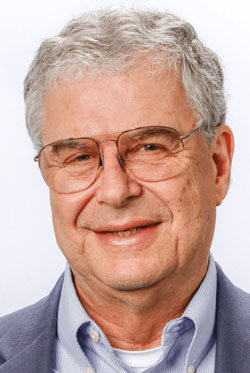In Memoriam: George Weinstock, PhD

George Weinstock, PhD, former professor in the Department of Microbiology and Molecular Genetics and the Department of Biochemistry and Molecular Biology, died Nov. 26, 2023. He was 74.
A world leader and pioneer in genomics, he recently retired as associate director for microbial genomics at the Jackson Laboratory for Genomic Medicine in Farmington, Conn., to focus full-time on his company General Biomics, where he served as executive vice president and chief scientific officer. He was named emeritus professor at UConn Health.
Weinstock earned his PhD from the Massachusetts Institute of Technology and completed a postdoctoral fellowship with Dr. I.R. Lehman at Stanford University School of Medicine. Before joining the Jackson Laboratory, he was on faculty at Washington University in St. Louis, where he served as associate director of the Genome Institute. He also served as co-director of the Human Genome Sequencing Center at Baylor College of Medicine.
He joined McGovern Medical School from the National Institutes of Health in 1984 as a faculty member in the Department of Biochemistry and Molecular Biology. Though the focus of his lab was on the RecA protein in E. coli, he collaborated widely and developed many tools for bacterial genetics, especially for genome analysis even before the days of high-throughput sequencing.
Sam Kaplan, PhD, founding department chair, remembered, “When I moved here in 1989 to develop a new Department of Microbiology (now Microbiology and Molecular Genetics), one of my first tasks was to recruit faculty to the new department.
“This proved to be an enormous undertaking since there was a void, which is not conducive to the recruitment process. It was my good fortune that George Weinstock, a professor in biochemistry here, became interested in the new department and together we undertook this onerous task. It could not have been done without George. But that was only the beginning, and I can state that George became instrumental in establishing the new department and recruiting a number of outstanding faculty, some of whom are still with the department today. He was also involved in forming the new curriculum for the department.
“Through the years, George continued to lend his vast expertise on behalf of the department, and in particular he recognized early on the importance of the techniques of DNA sequencing and its application to the elucidation of genome structure and function, especially in the understanding of the microbiome, which is a major research area with applications to human and animal health, as well as the environmental sciences.
“I am more than pleased to say that George was an outstanding colleague, a first-rate scientist, and a valued friend. The world and the field of microbiology will be much poorer for his loss.”
MMG chair emerita Terri Koehler, PhD, recalled: “Dr. Weinstock was one of the first McGovern faculty to develop a microbiology research program at our school. George was an outstanding microbiologist and geneticist. Always at the forefront of technology, he moved easily from classic studies of bacteriophage to some of the first bacterial genomics studies, to medical applications of microbiome research. George was a strong advocate for young faculty. I will always be grateful to have been one of the many who were mentored by him.”
“Dr. Weinstock was a great colleague and friend who will be missed greatly,” said Steve Norris, PhD, professor of pathology and laboratory medicine. “He was instrumental in propelling the Medical School and the world toward the effective use of genomic sequencing and analysis in resolving important scientific and medical questions.”
At the Medical School, Weinstock and Norris collaborated one the first bacterial genome projects – sequencing the entire genome of bacterium Treponema pallidum, which causes syphilis.
“George and I were smiling like Cheshire cats when we got word in 1996 that NIH was going to fund the sequencing of the 1 million base pair Treponema pallidum genome at a cost of $1.5 million,” Norris recalled. “Things have changed a bit with the development of high-throughput sequencing; Dr. Mike Lorenz told me that his lab routinely sequences the genome of the yeast Candida albicans (which is about 25 times larger) at a cost of $120!”
Although current MMG chair Lorenz was never a colleague of Weinstock’s, he still was influenced by him: “His personal impact on many people may have been his most enduring legacy. He left MMG before I started and I never collaborated with him, but he nevertheless took a genuine interest in my career, always stopping to chat whenever we would see each other, always with positive and encouraging words. He certainly left his mark on MMG and its people in ways far greater than the few items still around with a ‘GW’ on the side.”
Added Barbara Murray, MD, J. Ralph Meadows Professor, Division of Infectious Diseases, Department of Medicine, “George was a wonderful friend and collaborator (e.g., we co-authored 40 papers) for many years. Indeed, my interaction with George was one of the most important guiding aspects of my early career. He (a basic scientist) anticipated that a physician (such as myself) could have unique insights into the formation of infections, and we worked together to develop projects that would further basic science and translational knowledge relating to the pathogenesis of bacterial diseases. I remain deeply grateful and indebted to him for his guidance and input over many years. He will be greatly missed.”
Weinstock was a principal investigator in research producing genome sequences for rat, macaque, bovine, sea urchin, honey bee, and fruit fly and sequenced Dr. James Watson’s genome. He was a fellow of the American Association for the Advancement of Science, the American Academy of Microbiology and the American Academy of Biology.
He is survived by his wife of 49 years, Erica Sodergren, PhD; and daughter Beth.